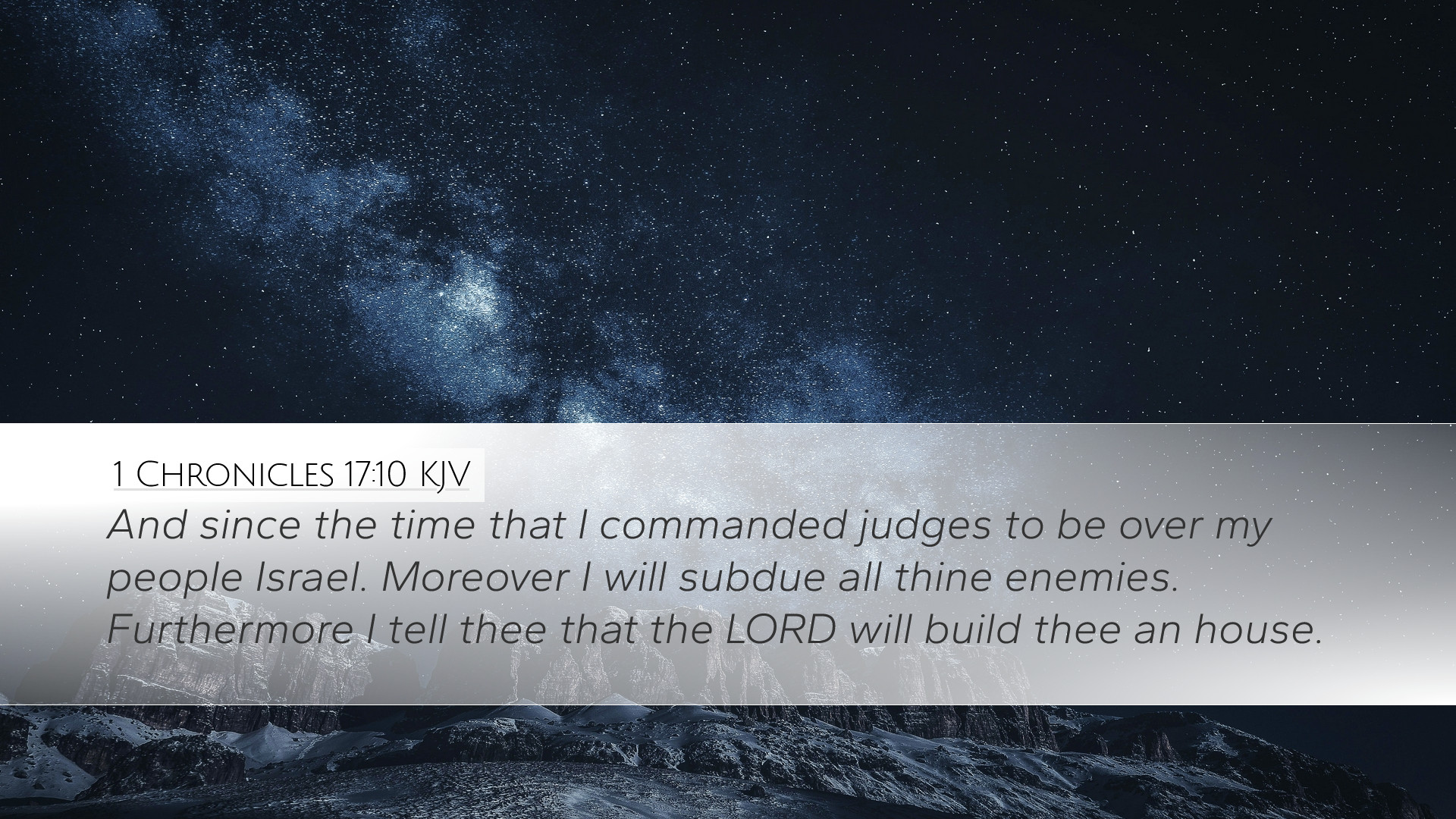Commentary on 1 Chronicles 17:10
Verse: 1 Chronicles 17:10 - "And since the time that I commanded judges to be over my people Israel, moreover I will subdue all thine enemies. Furthermore I tell thee that the LORD will build thee a house."
Introduction
This verse occurs in a pivotal moment in the narrative of David's reign. It's essential to understand the historical context in which this promise of God to David is made. The commentaries of Matthew Henry, Albert Barnes, and Adam Clarke provide profound insights into this passage.
Contextual Background
The passage sits within a broader narrative where David, having brought the Ark of the Covenant to Jerusalem, desires to build a temple for the Lord. However, God's response through the prophet Nathan redirects David's intentions and emphasizes divine promise instead of human endeavor.
Matthew Henry's Commentary
Henry points out the significance of God's sovereign decision to establish a dynasty through David. He emphasizes the contrast between David's desire to build a house for God and God’s intent to build a “house” (a dynasty) for David. This divine promise highlights God's grace and commitment to His covenant people.
God's Sovereignty
According to Henry, God's promise to subdue David's enemies is a clear demonstration of divine sovereignty. This indicates not just victory in battles but the establishment of peace and security for Israel, which underscores God's protective role over His people. The mention of 'judges' illustrates God's previous governance and foreshadows how God will now work through David and his lineage.
Albert Barnes' Perspective
Barnes underscores the implications of the phrase "I will subdue all thine enemies." This promise relates to Israel's historical context, where military threats were constant. God's assurance conveys both protection and permanence in David's kingship, reinforcing that his reign will be upheld through divine support, thereby fostering a sense of confidence among the people.
Theological Implications
Barnes delves deeper into the theological implications of the “house” God promises to build. The imagery of a house here is twofold: it represents David's physical lineage and the spiritual legacy of the Messiah. This insight connects to the broader biblical narrative of Jesus Christ as a descendant of David, showcasing God's redemptive plan through generations.
Adam Clarke's Analysis
Clarke offers a linguistic analysis of this verse, pointing out key Hebrew terms that reflect divine intentions. He explains that God's promise is unconditional, highlighting the grace central to God’s covenant relationship with David. Clarke emphasizes the notion that even though David may aspire to build for God, it is ultimately God who constructs a lasting legacy.
Identification of Judges and Kingship
Clarke also notes the reference to the "judges" and their role in Israel's history. He draws attention to a transition from judges to a kingship model in Israel, suggesting that while judges served under God's direct rule, a king like David would be a figure of sovereign authority established by divine choice and blessing.
Application for Pastors and Theologians
This verse calls for profound reflection on the nature of God’s promises and the spiritual legacy that believers are invited to participate in. Pastors can derive vital lessons about reliance on God's sovereignty in leadership and ministry endeavors.
Leadership Insights
- Divine Assurance: Just as God assured David of His support, spiritual leaders can be encouraged that God will enable their tasks and protect their communities.
- Spiritual Legacy: The emphasis on building a house encourages believers to think about the lasting impact of their ministries, building not just physically but spiritually.
- God's Plans vs. Human Intentions: This story exemplifies how human initiative must align with divine will, reinforcing the need for prayerful consideration in decision-making.
Theological Reflections
For theologians, this passage prompts deeper exploration of themes such as:
- Covenant Theology: How does God's promise to David fit within the larger framework of covenant promises to His people?
- Christological Foreshadowing: The implications of this promise in the context of New Testament revelation through Jesus Christ.
- Divine Sovereignty: Understanding the nature of God’s intervention in the events of history and its implications for faith and practice today.
Conclusion
The promise found in 1 Chronicles 17:10 serves as a powerful reminder of God’s faithfulness and His sovereign plan. By integrating insights from Henry, Barnes, and Clarke, one can appreciate the multidimensional nature of this divine promise, which transcends mere historical account and speaks to profound spiritual truths relevant to today's church and its leaders.


